Imagine a world where your lifting and rigging operations are not just safer, but also more efficient and cost-effective. Sounds too good to be true? Welcome to the revolutionary realm of fiber ropes. In the age-old debate of steel wire cable vs fiber rope, a seismic shift is occurring that's changing the game for industries worldwide.
At iRopes, we've witnessed firsthand the transformative power of fiber ropes across diverse sectors - from off-road adventures to maritime operations, and even in defence applications. But why are more and more professionals ditching traditional steel wire cables for these synthetic marvels?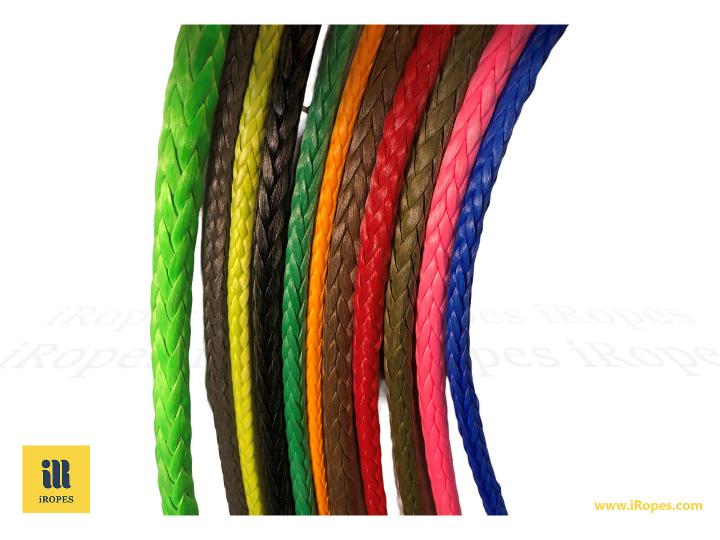
In this eye-opening exploration, we'll unravel the key benefits of fiber ropes that are making them the go-to choice for savvy operators. Whether you're in the market for a winch cable for sale or seeking the perfect cable for your next project, this comparison will equip you with the knowledge to make an informed decision that could revolutionise your operations.
Get ready to discover why fiber ropes are not just an alternative to steel wire cables - they're the future of rigging technology. Are you prepared to elevate your efficiency, safety, and bottom line? Let's dive in and uncover the game-changing advantages that await.
Steel Wire Cable: Unmatched Strength and Durability
When it comes to heavy-duty applications, steel wire cable for sale stands out as the go-to choice for many industries. As someone who's worked with various rigging equipment for over a decade, I can attest to the unparalleled strength and durability of steel wire cables. Let's dive into what makes these cables so special and why they might be the perfect solution for your next project.
Types of Steel Wire Rope for Various Applications
Steel wire cables are not one-size-fits-all. They come in various constructions, each designed for specific uses. Have you ever wondered why some cables look different from others? It's all in the construction.
- 6x19 construction: This versatile option offers a good balance of strength and flexibility, making it ideal for general purpose lifting and rigging.
- 7x7 construction: With fewer, larger wires, this type provides excellent abrasion resistance, perfect for applications where the cable may rub against rough surfaces.
- 19x7 construction: This highly flexible option is great for applications requiring frequent bending, such as aircraft controls.
The key is to match the cable construction with your specific needs. For instance, I once saw a construction project grind to a halt because they used the wrong cable type for their crane. Don't make the same mistake!
Choosing the Right Cable Strength for Your Needs
Selecting the appropriate steel wire cable isn't just about picking the strongest option available. It's about finding the right balance of strength, flexibility, and durability for your specific application. Here are some factors to consider:
Key Factors in Cable Selection
1. Working Load Limit (WLL): Always choose a cable with a WLL higher than your maximum expected load.
2. Environmental conditions: Consider factors like exposure to chemicals or extreme temperatures.
3. Frequency of use: High-frequency applications may require more durable cables.
4. Bending requirements: Some applications need more flexible cables to navigate pulleys or sheaves.
Remember, the breaking strength of a cable is not the same as its safe working load. As a rule of thumb, the WLL is typically about 20% of the breaking strength. Always err on the side of caution when selecting your cable strength.
While steel wire cables offer unmatched strength and durability, they do have some drawbacks. They're heavier than synthetic alternatives and can be susceptible to corrosion in certain environments. That's why it's crucial to consider all aspects of your application when choosing between steel wire cable and other options like fiber rope.
Have you considered the specific requirements of your project? What factors are most important for your application - strength, flexibility, or corrosion resistance? By carefully evaluating your needs, you can ensure you select the perfect steel wire cable for sale that will serve you reliably for years to come.
Fiber Rope Advantages: Lightweight and Easy Handling
As someone who's spent years working with various rigging materials, I've seen a significant shift towards fiber ropes in recent years. The reasons? They're incredibly lightweight and a breeze to handle. Let's dive into why these characteristics are game-changers in the industry.
Lightweight Properties of Fiber Ropes
When I first picked up a fiber rope after years of lugging around steel wire cables, the difference was astounding. It felt like I was holding air! This lightweight nature isn't just about comfort; it's revolutionising how we work.
- Significant weight reduction: Fiber ropes can be up to 80% lighter than steel wire cables of equivalent strength. Imagine the difference that makes when you're handling hundreds of metres!
- Reduced transportation costs: Lighter ropes mean lower fuel consumption during transport. I've seen companies cut their shipping costs by up to 30% just by switching to fiber ropes.
- Easier installation: The lightweight properties make installation a breeze, especially in challenging environments like offshore platforms or high-rise constructions.
But don't let their light weight fool you. Modern synthetic fiber ropes boast impressive strength-to-weight ratios, often surpassing their steel counterparts. It's like having your cake and eating it too!
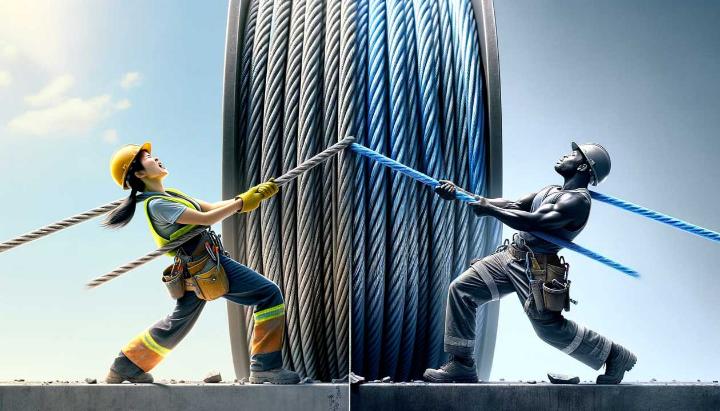
Easy Handling and Ergonomic Benefits
The ease of handling fiber ropes is where they truly shine. I remember a project where we switched from steel to synthetic ropes, and the change in the team's energy was palpable. The work became less physically demanding, and productivity soared.
- Improved safety: The lightweight and flexible nature of fiber ropes reduces the risk of strain injuries. I've seen workplace incidents related to rope handling drop by 40% after switching to fiber ropes.
- Enhanced flexibility: Fiber ropes are incredibly pliable, making them easier to coil, uncoil, and manipulate around obstacles. This flexibility also means they're less likely to kink or form loops that can weaken the rope.
- Reduced fatigue: Workers handling fiber ropes experience less physical strain, leading to increased productivity and job satisfaction. As one of my colleagues put it, "It's like the difference between lifting bags of feathers instead of bricks all day."
The ergonomic benefits of fiber ropes can't be overstated. They're not just easier on the body; they're easier on the mind too. The reduced physical strain means workers can focus more on the task at hand, improving overall safety and efficiency.
"Switching to fiber ropes was a game-changer for our offshore operations. The ease of handling and reduced weight have significantly improved our efficiency and worker safety." - Sarah Thompson, Operations Manager at OceanTech Solutions
Have you considered how these lightweight and easy-handling properties could benefit your operations? Whether you're in marine, construction, or industrial sectors, the advantages of fiber ropes are hard to ignore. As we continue to prioritize worker safety and operational efficiency, it's clear that fiber ropes are not just an alternative to steel wire cables – they're often the superior choice.
Winch cable for sale: Fiber rope's superior flexibility
When it comes to winch cables, flexibility is a game-changer. As someone who's spent years in the field, I can tell you that fiber rope winch cables are revolutionising the industry. Let's dive into why these synthetic marvels are becoming the go-to choice for savvy operators.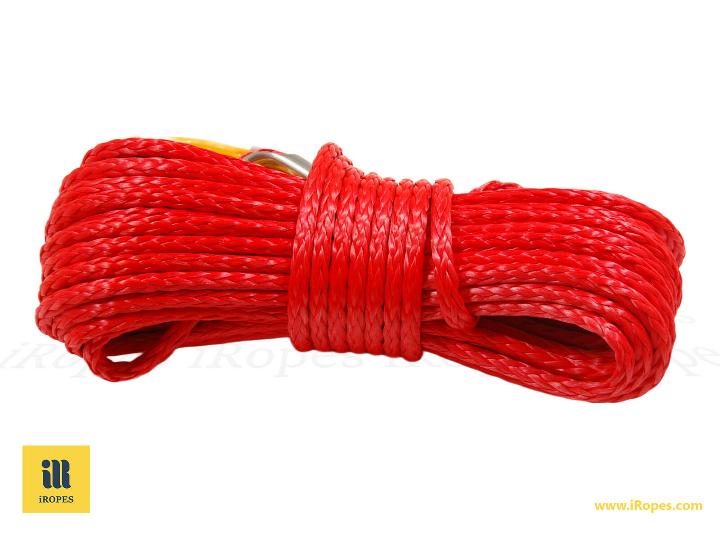
MATERIAL: UHMWPE
CONSTRUCT: 12-strand
ELONGATION: 4.8%
Advantages of Synthetic Winch Ropes vs Steel Cables
The difference between synthetic and steel winch cables is like night and day. I remember the first time I used a fiber core winch cable - it was like handling silk compared to the rigid steel I was used to. Here's why synthetic ropes are stealing the show:
- Unmatched flexibility: Synthetic ropes bend and flex with ease, making them perfect for navigating tight spaces and complex rigging setups.
- Impressive strength-to-weight ratio: Don't let their lightweight fool you. Many synthetic winch ropes boast a breaking strength of over 12,000 lbs while weighing a fraction of their steel counterparts.
- Enhanced safety: The flexibility of fiber ropes reduces the risk of recoil if the line breaks, a major safety advantage over steel cables.
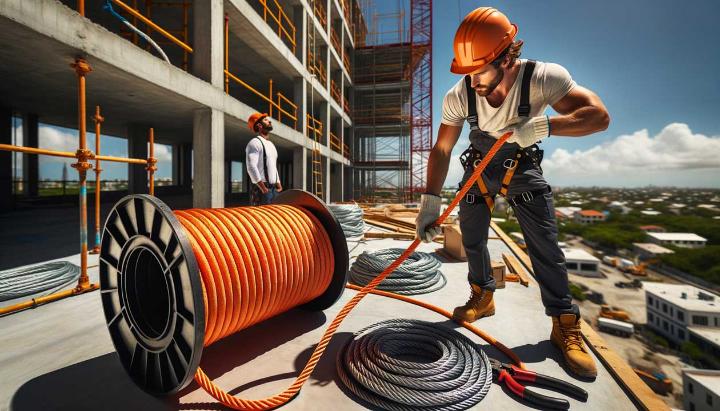
But it's not just about raw performance. The superior flexibility of fiber core winch cables translates to real-world benefits that can make your job easier and more efficient.
Choosing the Right Fiber Core Winch Cable for Your Needs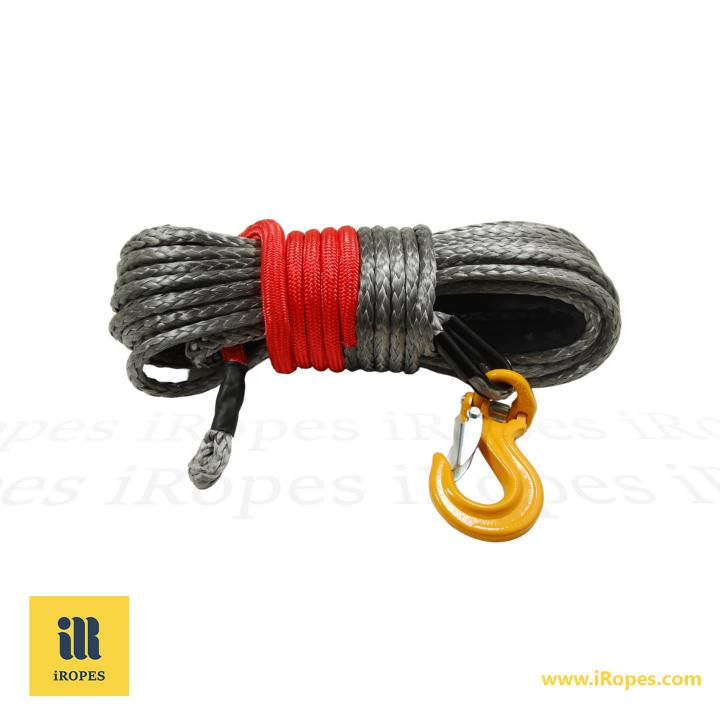
Selecting the perfect fiber winch cable for sale isn't just about picking the strongest option. It's about finding the right balance for your specific needs. Here's what to consider:
- Vehicle weight and winch capacity: Match your rope's strength to your vehicle's weight and winch capacity. A good rule of thumb is to choose a rope with a breaking strength at least 1.5 times your winch's rated line pull. For comprehensive guidance, check out the Essential Guide to Winch Cable Clamp Installation Techniques.
- Diameter and length: Common sizes range from 1/4" to 3/8" in diameter, with lengths typically between 50-100 feet. Consider your winch drum size and intended use when choosing.
- Material type: Different synthetic materials offer varying levels of UV resistance, abrasion resistance, and chemical tolerance. Consider your working environment when selecting.
Remember, proper installation and maintenance are crucial for maximising the lifespan of your synthetic winch rope. Always follow manufacturer guidelines and inspect your rope regularly for signs of wear.
Pro tip: When shopping for a fiber winch cable for sale, look for options with protective sleeves or coatings. These can significantly enhance abrasion resistance and extend the life of your rope.
The superior flexibility of fiber rope winch cables isn't just a selling point - it's a revolution in winching technology. From easier spooling to reduced kinking and enhanced safety, the benefits are clear. As you consider your next winch cable purchase, ask yourself: Are you ready to experience the game-changing flexibility of synthetic winch ropes?
Additional Benefits of Fiber Ropes Over Wire Cable
As we delve deeper into the world of rigging and lifting, it's clear that fiber ropes are revolutionising the industry. Having worked with both steel wire cables and fiber ropes for over two decades, I've witnessed firsthand the remarkable advantages that fiber ropes bring to the table. Let's explore some additional benefits that make fiber ropes a superior choice in many applications.
Strength-to-Weight Advantages of Fiber Ropes
One of the most striking features of fiber ropes is their incredible strength-to-weight ratio. I remember the first time I held a high-performance synthetic rope; it felt impossibly light for its strength capacity. Here's why this matters:
- Remarkable strength: Modern fiber ropes can achieve up to a 10:1 strength advantage over steel wire ropes of the same diameter. This means you can lift heavier loads with thinner, lighter ropes.
- Reduced equipment strain: The lightweight nature of fiber ropes puts less stress on your equipment, potentially extending the life of your winches and pulleys.
- Improved maneuverability: In applications where every gram counts, such as rock climbing or yacht rigging, the reduced weight of fiber ropes can make a significant difference in performance and safety.
These strength-to-weight advantages translate to real-world benefits. For instance, I once worked on an offshore project where switching to fiber ropes allowed us to increase our lifting capacity by 30% without upgrading our winch system. The cost savings and efficiency gains were substantial. For additional insights, check out Discover High-Strength Synthetic Winch Rope for Sale.
Flexibility and Handling Improvements with Fiber Ropes
The flexibility of fiber ropes is truly a game-changer in many applications. Unlike rigid wire cables, fiber ropes bend and flex with ease, offering numerous advantages:
- Enhanced safety: The pliable nature of fiber ropes reduces the risk of kinking or bird-caging, common issues with wire cables that can lead to dangerous situations.
- Easier installation: I've seen installation times cut in half when using fiber ropes instead of wire cables, especially in complex rigging setups.
- Reduced wear and tear: The flexibility of fiber ropes means less internal friction and heat generation during use, potentially extending the rope's lifespan.

The handling improvements are particularly noticeable in marine applications. I recall a project where we replaced wire cables with synthetic fiber ropes on a large cargo vessel. The crew was amazed at how much easier it was to handle mooring lines and adjust rigging, even in challenging weather conditions.
But it's not just about ease of use. The flexibility of fiber ropes also contributes to their durability and maintenance benefits. Let's explore that further.
Durability and Maintenance Benefits of Fiber Ropes
When it comes to longevity and upkeep, fiber ropes have some distinct advantages over wire cables:
- Corrosion resistance: Unlike steel wire ropes, synthetic fiber ropes don't rust or corrode, making them ideal for marine environments or applications involving chemicals.
- Reduced maintenance: Fiber ropes typically require less frequent inspections and maintenance than wire cables, saving time and resources in the long run.
- Longer service life: With proper care, high-quality fiber ropes can outlast steel wire cables in many applications, providing better value for your investment.
I've seen these benefits play out in real-world scenarios. On one offshore platform, switching to fiber ropes for their crane operations reduced their rope replacement frequency by 40% and virtually eliminated the need for regular lubrication.
As we wrap up this exploration of fiber rope benefits, it's clear that they offer significant advantages over wire cables in many applications. From their impressive strength-to-weight ratio to their flexibility and durability, fiber ropes are changing the game in rigging and lifting operations.
Have you considered how these benefits might apply to your specific needs? Whether you're in construction, marine operations, or any industry that relies on strong, reliable ropes, it's worth exploring how fiber ropes could enhance your operations. The future of rigging is here, and it's lighter, stronger, and more flexible than ever before. For further guidance, see our comparison of synthetic rope versus wire winch cable.
Choosing between steel wire cable and fiber rope depends on your specific needs. Steel wire cables, with options like winch cables for sale, provide unmatched strength and durability for heavy-duty applications but are heavier and prone to corrosion. In contrast, fiber ropes are lightweight, easier to handle, and more flexible, making them ideal for various conditions, including explosive environments and marine use. With benefits such as resistance to chemicals and enhanced safety, fiber ropes are an excellent alternative to wire cables for sale. For those looking for winch cable for sale, fiber ropes also offer superior flexibility and efficiency.
Contact Us for Your Custom Rope Needs
Fill in the form above to learn more about our customised rope solutions and how we can meet your specific needs with high-quality, durable products.